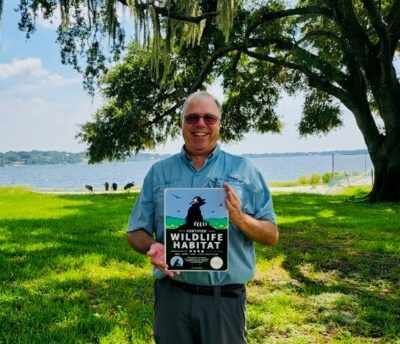Babson Park, FL. (August 13, 2024)- Webber International University is proud to announce the certification of its campus as a National Wildlife Habitat by the National Wildlife Federation (NWF). This recognition highlights the university’s commitment to providing a sustainable environment that supports local wildlife, including bees, butterflies, birds, and amphibians.
Dr. Marc Behrendt, an Associate Professor at Webber, has been instrumental in this achievement. Dr. Behrendt, who teaches Florida Ecology, Entomology, Human Anatomy, Microbiology, and Medical Terminology, is a passionate advocate for wildlife conservation and sustainable practices. He has been actively involved with various conservation organizations, including Archbold Biological Station, Conservation Florida, the Nature Conservancy’s Disney Wilderness Preserve, and the Florida Fish and Wildlife Conservation Commission.
“My Ohio home was a certified backyard wildlife habitat,” shared Dr. Behrendt. “After moving to Florida in 2017 and witnessing the natural beauty of the state, I felt it was essential to extend this certification to the Webber campus, recognizing its beautiful perimeter and rich habitats.”
The certification aligns with the NWF’s strategic plan to enhance America’s fish and wildlife populations. Amidst large-scale habitat destruction, the NWF, along with Conservation Florida, encourages homeowners and institutions to create spaces that provide food, water, shelter, and breeding grounds for wildlife. This initiative is particularly crucial as wildlife faces rapid habitat loss due to changing land and water conditions.
Webber’s President/CEO Dr. Nelson Marquez stated that “Webber International University is truly blessed to be in a very unique location…what others may see as a constraint in attracting students to consider coming to Webber because of its rural setting, we find it to be one of our strengths. Here at Webber, we are surrounded by a “natural lab” where students can observe and learn about wildlife in “real time,” not just through books and online readings.
“This certification is more than just highlighting Webber’s commitment to providing a sustainable environment. It also signals Webber’s full commitment in ensuring that future generations will still have the opportunity to learn about and experience nature, its flora and fauna, and define the role that they will play in preserving it for the next generations” said Dr. Marquez.
The certification requirements for the National Wildlife Habitat encompass several key elements. The campus includes a variety of native plants that bloom in multiple seasons, providing a reliable food source for wildlife. Water is readily available through Crooked Lake, a natural water features adjacent to the campus, serving as a vital resource for different species. The university’s gardens and campus perimeter offer ample cover and shelter for wildlife, supporting spaces conducive to breeding and raising young. Additionally, Webber emphasizes sustainable practices by maintaining a balance of 50-70% native plants and avoiding the use of neonicotinoids, contributing to a healthier and more sustainable environment for wildlife.
About the National Wildlife Federation
The National Wildlife Federation is America’s largest and most trusted conservation organization, working to unite all Americans to ensure wildlife thrives in a rapidly changing world. For more information, visit www.nwf.org.


